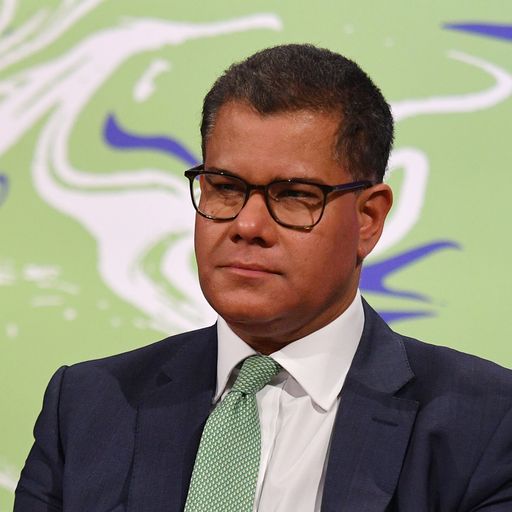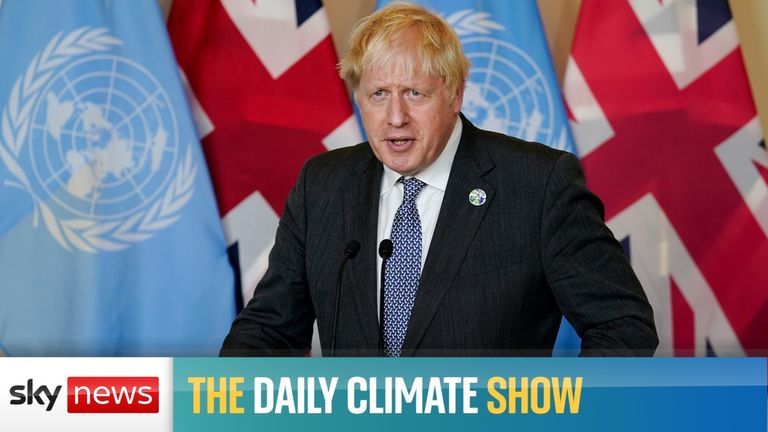Climate change: $100bn global finance promise won't be met until 2023 - three years later than hoped
Climate finance funds adaptation and mitigation in poor countries and is seen as crucial to securing trust and engagement at forthcoming climate negotiations.
Monday 25 October 2021 17:03, UK
Highly anticipated plans to fund climate measures in poor countries have finally been unveiled days before nations meet for urgent climate change negotiations in Glasgow.
A long-standing pledge by developed countries to channel $100bn (£73m) a year to developing countries is set to be met in 2023, three years later than hoped, according to the new Climate Finance Delivery Plan.
This is the most detailed pathway yet published that shows how wealthy nations - who tend to have the highest historical emissions - will fund climate change measures in poor nations, which have historically low emissions and can also be the most vulnerable to climate change.
Alok Sharma, the cabinet minister in charge of the COP26 talks that are hosted by the UK, launched the new plan with ministers from Germany and Canada who led it.
Mr Sharma said: "We can and must do more to get finance flowing to developing nations.
"In the lead up to COP26, it's vital we see further pledges from developed countries and action on key priorities such as access to finance and funding for adaptation."
In 2009, at COP15, nations promised to channel $100bn (£73m) of public and private money from rich to poor countries every year by 2020, and in 2015 agreed to extend this goal through to 2025.
But that promise was not fulfilled. In 2019, the latest year for which data is available, only about $80bn was provided. New data suggests the target was likely missed in 2020 and will probably also fall short in 2021 and 2022.
The data suggests countries may even mobilise more than $100bn a year in 2024 and 2025, a gesture that some may perceive as an acknowledgment of the previous shortfall, although the report does not frame it as any form of compensation.
Sky News understands that lawyers involved from the US, a donor country and historically the biggest emitter, had been reluctant to suggest the country had any legal liability for the funding.
US President Joe Biden is also currently struggling to pass his key climate legislation, facing opposition from within his own party.
Mary Friel, COP26 policy manager at British Red Cross said people who are already on the front line of the impacts of climate change "simply cannot wait a further two years for help to arrive."
The timing of the publication, in the week before COP26 when leaders will attempt to hammer out new global commitments to stop runaway climate breakdown, is significant.
Developing countries may be reluctant to sign up to global climate agreements or new deals if they perceive old promises were broken.
Iskander Erzini Vernoit, policy adviser at E3G, said: "For COP26 to be success in keeping 1.5 degrees alive, developing countries must feel not only that existing $100bn finance commitments have been kept, but also that much more is coming."
He said interpretations will differ by country negotiating blocs.
"Some will say this is too little, too late, while others welcome the progress - but at the end of the day, this sum falls far below actual needs in the trillions."
Subscribe to ClimateCast on , , or .
COP26 president-designate Mr Sharma said: "There is still further to go, but this delivery plan, alongside the robust methodological report from the OECD, provides clarity, transparency and accountability.
"It is a step towards rebuilding trust and gives developing countries more assurance of predictable support."
The plan says its clear that "more work needs to be done to increase adaptation finance, which still lags behind finance for mitigation".
Mitigation covers measures to reduce greenhouse emissions, whereas adaptation helps countries cope with climate change, such as sea level rise or natural hazards.
Some poor, climate-vulnerable countries have very low emissions, so stand to benefit better from adaptation measures - though these can be hard to access due to bureaucracy.
But so far it has been harder to generate funding for adaptation than mitigation.
Watch the Daily Climate Show at 6.30pm Monday to Friday on Sky News, the Sky News website and app, on YouTube and Twitter.
The show investigates how global warming is changing our landscape and highlights solutions to the crisis.







